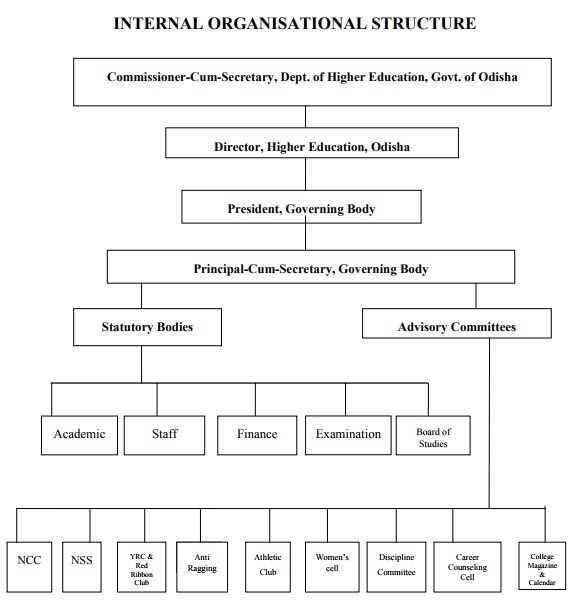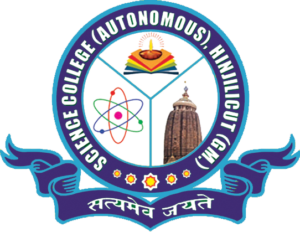The Science College( Autonomous), Hinjilicut, established in 1963 has the distinction of being one of the largest, oldest and the leading Colleges of Odisha. The college which came into being in 1961 has played a leading and innovative role.
MANAGEMENT OF THE COLLEGE
The following chart shows the Administrative Hierarchy for the smooth Management of the College

STATUTORY BODIES
SL. NO. | STATUTORY BODIES |
1 | Governing Body |
2 | Academic Council |
3 | Board of Studies |
4 | Finance Committee |
NON-STATUTORY BODIES
SL. NO. | NON-STATUTORY BODIES |
1 | Planning and Evaluation Bodies |
2 | Grievance Appeal Committee |
3 | Examination Committee |
4 | Admission Committee |
5 | Library Committee |
6 | Student Welfare Committee |
7 | Extracurricular Activities Committee |
8 | Academic Audit Committee |
The Governing Body
Term: The Governing Body shall be reconstituted every three years except in the case of UGC nominee who shall have a term of five years.
Meetings: Meetings of the Governing Body shall be held at least twice a year.
Functions of the Governing Body:
Subject to the existing provision in the bye-laws of respective college and rules laid down by the state government/parent university, the Governing Body shall:
- Guide the college while fulfilling the objectives for which the college has been granted autonomous status.
- Institute scholarships, fellowships, studentships, medals, prizes and certificates on the recommendations of the Academic Council
- Approve new programmers of study leading to degrees and/or diplomas.
- All recruitment of Teaching Faculty/Principal shall be made by the Governing Body/state government as applicable in accordance with the policies laid down by the UGC and State Government from time to time.
- To approve annual budget of the college before submitting the same at the UGC.
Perform such other functions and institute committees, as may be necessary and deemed fit for the proper development of the college
SL. NO. | CATEGORY | NAME OF G.B. MEMBERS WITH ADDRESS | NOMINATED AS |
1 | Management | Smt. V. Sugnanan Kumari Deo | President |
2 | Management | Dr. B. Seketh Rama Rao, Home Farm, Nirmaljhar, Kholikote | Member |
3 | Management | Maj. Rama Raman Padhy, Educationist & Secretary, K.C. Trust Management Committee | Member |
4 | Management | The Block Development Officer, Hinjilicut | Member |
5 | Management | Hinjilicut The Executive Engineer, R & B | Member |
6 | Teachers of the College (Nominated by the Principal based on Seniority) | Smt. Samparna Rani Dash, Reader in Zoology, Science College(Auto.), Hinjilicut | Member |
7 | Teachers of the College (Nominated by the Principal based on seniority by rotation) | Dr. Manas Mohan Baliarsingh, Reader in Zoology, Science College (Auto.), Hinjilicut | Member |
8 | Educationist (Nominated by the Management) | Dr. Prakash Chandra Mishra, Retd. Prof. in Commerce, Berhampur University | Member |
9 | UGC Nominee (Nominated by the UGC) | Dr. Ehsan Ahmed Khan, Prof. of Statistics, Jamia Hamdard, New Delhi | Member |
10 | State Government Nominee(DHE) | Dr. Laxmikant Tripathy, Regional Director of Education, Berhampur | Member |
11 | University Nominee (Nominated by the Vice Chancellor, Berhampur University) | Dr. Sukanta Kumar Tripathy, Prof. in Physics, Berhampur University | Member |
12 | Principal of the College (Ex-Officio) | Dr. Swastika Padhy, Principal Science College (Autonomous), Hinjilicut | Ex- Officio Secretary |
ACADEMIC COUNCIL
COMPOSITION OF ACADEMIC COUNCIL:
- The Principal(Chairman)
- All the Heads of Departments in the college
- Four teachers of the college representing different categories of teaching staff by rotation on the basis of seniority of service in the college.
- Not less than four experts/academicians from outside the college representing such areas as Industry, Commerce, Law, Education, Medicine, Engineering, Sciences etc., to be nominated by the Governing Body.
- Three nominees of the university not less than Professors.
- A faculty member nominated by the Principal (Member Secretary).
Term: The term of the nominated members shall be three years.
Meetings: Academic Council shall meet at least twice a year.
Functions of the Academic Council:
The Academic Council shall have powers to:
- Scrutinize and approve the proposals with or without modification of the Boards of Studies with regard to courses of study, academic regulations, curricula, syllabi and modifications thereof, instructional and evaluation arrangements, methods, procedures relevant thereto etc., provided that where the Academic Council differs on any proposal, it shall have the right to return the matter for reconsideration to the Board of Studies concerned or reject it,after giving reasons to do so.
- Make regulations regarding the admission of students to different programs of study in the college keeping in view the policy of the Government.
- Make regulations for sports, extra-curricular activities, and proper maintenance and functioning of the playgrounds and hostels.
- Recommend to the Governing Body proposals for institution of new programs of study.
- Recommend to the Governing Body institution of scholarships, studentships, fellowships, prizes and medals, and to frame regulations for the award of the same.
- Advise the Governing Body on suggestions(s) pertaining to academic affairs made by it.
- Perform such other functions as may be assigned by the Governing Body.
BOARD OF STUDIES
Composition of Board of Studies:
- Head of the Department concerned (Chairman).
- The entire faculty of each specialization.
- Two subject experts from outside the Parent University to be nominated by the Academic Council.
- One expert to be nominated by the Vice-Chancellor from a panel of six recommended by the college principal.
- One representative from industry/corporate sector/allied area relating to placement.
- One postgraduate meritorious alumnus to be nominated by the principal. The Chairman, Board of Studies, may with the approval of the principal of the college, co-opt:
(a) Experts from outside the college whenever special courses of studies are to be formulated.
(b) Other members of staff of the same faculty.
Term: The term of the nominated members shall be three years.
Meetings: The Board of Studies shall meet at least twice a year.
Functions:
The Board of Studies of a Department in the college shall:
- Prepare syllabi for various courses keeping in view the objectives of the college, interest of the stakeholders and national requirement for consideration and approval of the Academic Council;
- Suggest methodologies for innovative teaching and evaluation techniques.
- Suggest panel of names to the Academic Council for appointment of examiners.
- Coordinate research, teaching, extension and other academic activities in the department/college.
Finance Committee
Composition:
- The Principal (Chairman).
- One person to be nominated by the Governing Body of the college for a period of two years.
- One Senior- most teacher of the college to be nominated in rotation by the Principal for two years. The Finance Committee will be an advisory body to the Governing Body, and will meet at least twice a year to consider:
- Budget estimates relating to the grant received/ receivable from UGC and income from fees etc. collected for the activities to run the Scheme of Autonomy.
- Audited Accounts for the above.
Similarly the following committees will be constituted as per the guideline of UGC:
- Planning & Evaluation Committee
- Grievance Appeal Committee
Examination Committee:
The Committee will look into adoption of following common programmes:
Semester pattern of study
Continues internal assessment
Credit/ Grading system
Students feed back
Self-appraisal by teachers
It will also conduct at least 02 internal Examinations per semester and 01 semester ending examination.
Admission Committee
Library Committee
Student Welfare Committee
Extra-Curricular Activities Committee
Academic Audit Committee
The other Statutory Bodies are:
Executive Committee
Academic Council
Board of Studies
Finance Committee
DATE | GB RESOLUTION | DOWNLOAD |
30-03-2022 | GB Proceeding | |
12-01-2021 | GB Proceeding | |
08-09-2020 | GB Proceeding | |
21-06-2020 | GB Resolution | |
01-06-2019 | GB Proceeding | |
09-10-2018 | GB Proceeding | |
19-07-2017 | GB Resolution | |
22-08-2016 | GB Proceeding | |
08-05-2016 | GB Proceeding | |
30-06-2015 | GB Resolution | |
30-03-2015 | GB Proceeding | |
02-08-2014 | GB Proceeding | |
21-12-2013 | GB Proceeding |


